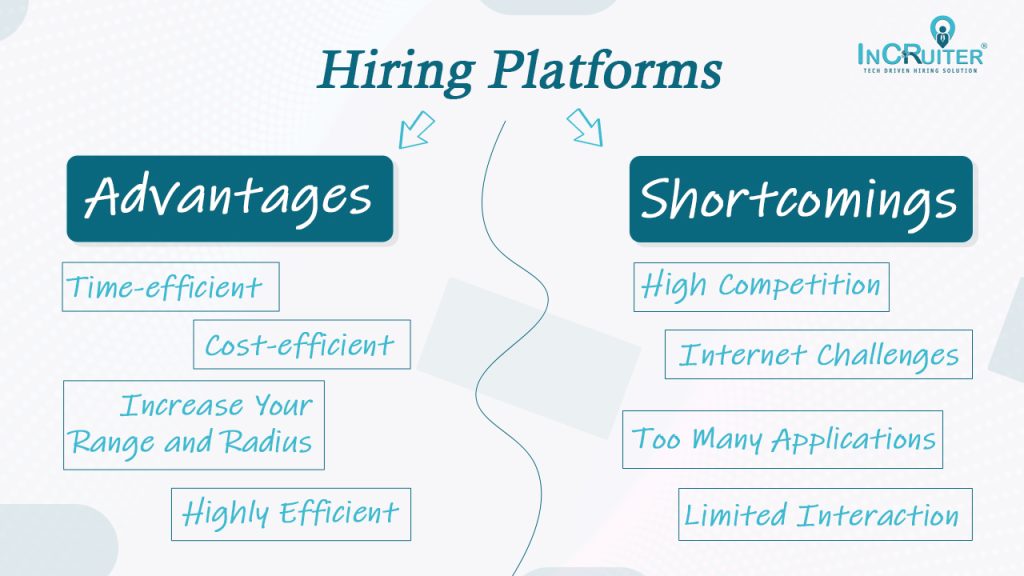
Living in a fast-paced world, the race to find a decent job or upgrade your current position to one with more perks is never-ending. The standard of living keeps changing and becoming more expensive as time passes, and securing a stable job is necessary to meet the current living standards. This is where online job portals come in. In a country like India, where finding a good job is a need and an expectancy to afford the basic amenities and battle the staggeringly high unemployment numbers, online job portals or hiring platforms offer respite and opportunities to those looking for jobs. As reported in April 2022, India’s unemployment rate was 7.83%.
However, online job portals have their advantages and shortcomings. While they make searching for companies with relevant openings convenient for job seekers and help companies find the right match for their team, there are also various downsides to hiring platforms. To make the hiring process smoother and more efficient, companies employ recruitment platforms that offer their interview services to scour for the best match out of all the candidates or applicants.
Also Read: Land The Perfect Hire: Learn How Interview Outsourcing Supercharges Your Hiring
What are the Most Popular Hiring Platforms in India?
India is home to multiple job portals to provide employment opportunities for job seekers, such as:
- Shine
- Naukri
- Internshala
- Snaphunt
- Indeed
- Monster India
- Glassdoor
What are the Advantages of Hiring Platforms?
Searching for jobs via online job portals makes the hiring process comfortable for job seekers and recruitment companies.
Time-efficient
Online recruitment portals are excellent for beginners searching for jobs or those wishing to switch careers without wasting time. Since most portals provide their job description, role requirements and the eligibility criteria and also allow you to upload your resume, it saves you the time and effort of visiting and ringing up various companies for a job appointment or interview. Companies hiring receive the uploaded resume instantly, allowing them to evaluate your application and revert.
Increase Your Range and Radius
Job portals allow job seekers to browse through and contact various companies through a single platform. Similarly, recruiting companies can also expand their reach by targeting job seekers from all over the country. Online portals come in handy, especially while looking for work from home or remote jobs.
Cost-efficient
Physically sourcing candidates and recruiting them is time-, cost- and resource-consuming. In addition to employee salaries and benefits, companies also have to shoulder the cost of searching, recruiting, and training candidates. Once the searching and hiring process is over, the next stage is training, which is essential to ensure the recruit is well-versed with the company and their tasks. Job portals manage the initial hiring processes for companies.
Highly Efficient
Recruitment portals are highly efficient. They save you the time and money of running assessment and background checks by screening, asking the necessary questions, and narrowing down the search, so both companies hiring and job seekers only come across the relevant job postings.
Also Read: HR Tech startup InCruiter secures ₹11 million funding
What are the Shortcomings of Hiring Platforms?
A coin has two sides; everything has positive and negative aspects, including hiring platforms.
High Competition
A downside to hiring platforms is the competition level. As a job seeker, you must ensure that your CV and profile are top-notch and spotless, highlight your talent and strong points, and make you stand out. Since the number of applicants is high, companies skim through the applications quickly and only tend to pick candidates whose profiles they find impressive enough.
Internet Challenges
Sometimes, companies require candidates to fill out lengthy applications instead of simply uploading their resumes to gauge their applications rigorously. However, while this process allows companies to assess the applications more carefully, the long process might be off-putting for the candidates. Additionally, in case of a technological issue, such as a low battery, or internet problems, such as poor connectivity, candidates might lose the data they entered, requiring them to start from scratch. There is also a strong chance of internet or audio and video issues causing hindrance during an online interview.
Too Many Applications
Not only do a high number of applications increase competition, but they also club all kinds of applications together. Hiring platforms do not filter applications; anyone can apply for any job opening, which often merges applications from the suitable candidates and applications from candidates who might be a better fit for a different role.
Limited Interaction
While it is true that hiring platforms allow you to apply for jobs pan-India or in another country, they also limit your interactions. Your interviews and assessments are limited to the internet, such as telephonic interviews, email interactions, or virtual reviews. As nerve-wracking as in-person interviews might be, they are a better indicator of employee and employer compatibility than a virtual hiring process.
Final Thoughts
Hiring platforms make it efficient and convenient for people to search for jobs or hire potential candidates without wasting their time and resources. However, online portals also have shortcomings, such as connectivity issues, many applications, and competition.
Ready to Transform Your Hiring Process?
Discover how our AI-powered interview platform can streamline your recruitment and find the best candidates faster.






